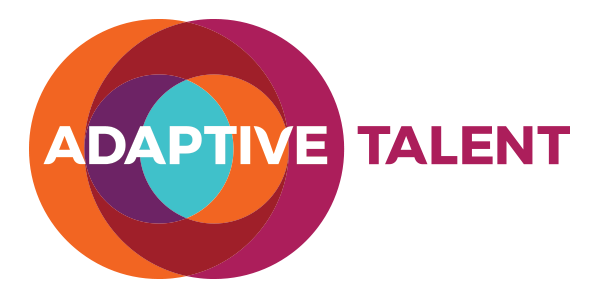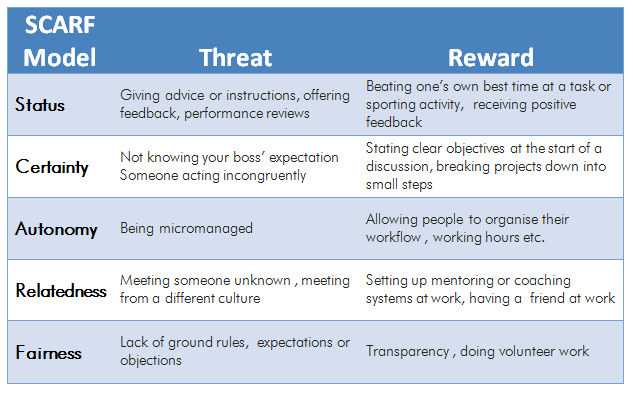Linda Ray at Brainwaves For Leaders just wrote a great post on brain friendly tips for facilitation, with a link to tips on presentations. These are very easy and leverage the latest in brain research showing how you can minimize threat responses and work with attention spans (hint: max 20 minutes).
The SCARF Model is something super relevant to all kinds of relationships, including facilitating a discussion or sharing information via a talk. The model was designed by David Rock and has these elements (descriptions are from David himself with a bit of help from me):
- Status is about relative importance to others. Anything that makes a person feel uncertain or at risk triggers the same part of the brain responsible for pain (in this case, social pain).
- Certainty concerns being able to predict the future.
- Autonomy provides a sense of control over events. Autonomy also triggers our reward center of our brain because humans crave control, just as they crave certainty (this grew out of pattern recognition which helped our ancestors not get eaten by animals in the savanna).
- Relatedness is a sense of safety with others, of friend rather than foe. When you trust and are connected emotionally to people, it releases oxytocin the hormone responsible for attachment behaviours (baby to mom, life partners, close friends, etc.)
- Fairness is a perception of fair exchanges between people. Humans are wired for social connections and fairness connotes in-group status because of similar patterns. Procedural fairness is especially important, so transparency and certainty are all co-factors in how a person perceives her/his treatment.
Finally, a leader’s ability to have self awareness and the ability to sense / feel the emotions of the group are especially important. Our world is moving fast and we have become so task focused and device distracted that often we completely miss all the subtle signals people transmit. Those signals are critical to honest, productive, healthy relationships that can grow into long term, mutually beneficial relationships and often friendships.
It’s an incredible time to work in the leadership and team development space. Fantastic neuroscience research is validating the importance of mindfulness not only for personal happiness and effectiveness but also how critical aspects of leadership – like facilitating a meeting or presenting an idea – can all benefit from honouring our biology and shared human needs.
—
Adaptive Talent is a talent consultancy designed to help organizations achieve amazing results and ongoing adaptability. Founded in 2008 and based in Vancouver, Canada we offer retained search, assessments, total rewards consulting, training, leadership coaching and development programs, and culture & organizational development consulting.

